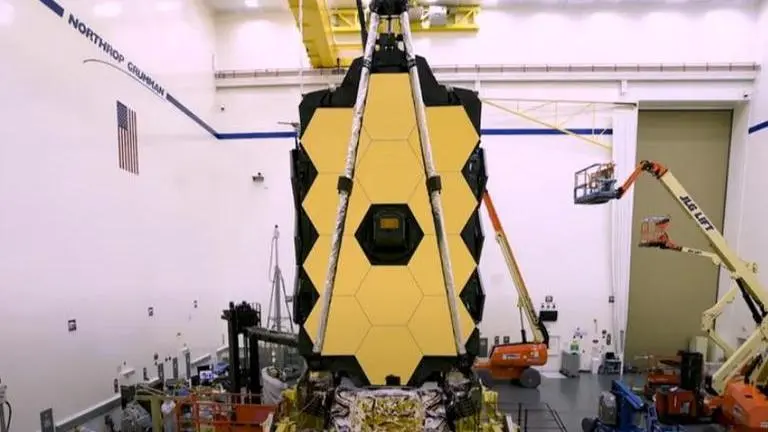Updated 12 December 2021 at 16:53 IST
Why NASA chose gold for the James Webb Space Telescope's mirrors?
The James Webb Space Telescope has been plated with gold due to elements properties like a high reflection of infrared light and extreme unreactivity.
- Science News
- 3 min read

The James Webb Space Telescope is at the end stage of its launch preparations and is just days away from unraveling new secrets about our universe. Touted as the most powerful telescope ever built, Webb will be escorted to space on December 22 on an Ariane 5 rocket and the scientists are faced with the challenge to execute the transportation without any risks to the observatory’s instruments.
While it is loaded with a bunch of utterly crucial instruments, its most recognisable, eye-catching, and most intriguing instrument is the 21-foot primary mirror, made of 18 small hexagonal mirrors, which have a plating of gold. Only if you're wondering why gold out of other abundant elements, we will tell you why NASA chose gold for the James Webb Space Telescope's mirrors.
🧰 To build the world’s most powerful telescope, you need to start with the right stuff.
— NASA (@NASA) December 12, 2021
Watch the new "Elements of Webb" series to see how the world's most powerful telescope came to be, and how @NASAWebb will help us #UnfoldTheUniverse: https://t.co/pzNBmMVHpU pic.twitter.com/Y1PfBePhNY
Here's why gold is 'Webb's best chance at seeing the cosmos'
It might have sounded a bit poetic, but it does have the most practical explanation. Before understanding the logic behind using gold for mirror-plating, it is necessary to understand how the Webb telescope would work. The telescope is basically an instrument that is extremely sensitive to the infrared light emerging from the farthest corners of our universe. A light beam becomes infrared when its wavelength gets stretched as it travels for billions of years and billions of light-years. The Webb telescope will gather these infrared wavelengths, break down their properties and squeeze out any and every information stored in them about their origin and the environment they travelled through in many years.
As for the usage of gold, NASA explains that plating it on the mirror will ensure the highest reflection of the infrared light to Webb's instruments. It is worth mentioning that the plating is at a microscopic level, about five men's wedding rings worth of gold, spread across 18 small hexagonal mirrors. According to NASA, our everyday mirrors normally have silver or aluminum in them but they are unsuitable owing to their inferior reflecting properties. Silver reflects 95% of the infrared light whereas aluminum reflects only 85% of the same in comparison to gold, which reflects 99% of all the infrared light that it encounters.
Advertisement
Another reason for using the precious element on the mirrors is that it is highly unreactive. Silver and aluminum, besides reflecting less infrared, also get tarnished easily and are not as durable as gold, which is extremely unreactive to elements out there in space. The telescope, which will lift off from Europe’s Spaceport in French Guiana, will be installed at the second Lagrange point or L2 which is 1.5 million kilometres from our planet and will collect data to reveal how the universe was when it emerged out of a big bang.
Image: YouTube/@James Webb Space Telescope
Published By : Harsh Vardhan
Published On: 12 December 2021 at 16:53 IST
